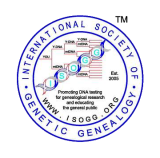Founder effect
From ISOGG Wiki
The founder effect is the reduction in genetic variation that results when a small subset of a large population is used to establish a new colony. The new population may be very different from the original population, both in terms of its genotypes and phenotypes. In some cases, the founder effect plays a role in the emergence of new species.
The term genetic drift is also used. Many people regard the two terms as synonymous.
Further reading
- Bottlenecks and founder effects. Understanding evolution website from the University of California Museum of Paleontology.
- Pomery C. Divided by the Pond: why genetic drift means US results can't pinpoint the origin of a British surname. Eastman's Online Genealogy Newsletter, Plus Edition, 23 September 2009. Available as a reprint in the May 2010 issue of the Phillips DNA Project's newsletter (pp6-9).
- Ann Gibbons. Life on the fertile frontier. Science 4 November 2011 Vol 334 (6056): 582.
Scientific papers
- Gauvin H, Moreau C, Lefebvre J-F et al (2014). Genome-wide patterns of identity-by-descent sharing in the French Canadian founder population. European Journal of Human Genetics 22, 814–821.
- Claudia Moreau, Claude Bhérer, Hélène Vézina, Michèle Jomphe, Damian Labuda, and Laurent Excoffier (2011). Deep Human Genealogies Reveal a Selective Advantage to Be on an Expanding Wave Front Science 25 November 2011: 334 (6059): 1148-1150.
- J M Greeff (2007). Deconstructing Jaco: genetic heritage of an Afrikaner. Annals of Human Genetics 71: 674–688.
Blog posts
- How a rare skin disease links South Africa to an 18th Century French seaman by Michèle Ramsay and Thandiswa Ngcungcu. The Conversation, 4 June 2017.
- Monday K. Recent founder's effect: bottlenecking and 6 Tahitian women on Pitcairn island . Hawaiian DNA blog, 21 December 2015.
See also
|
This article uses material in the public domain from the Talking Glossary of Genetic Terms and is reproduced courtesy of the National Human Genome Research Institute. |
